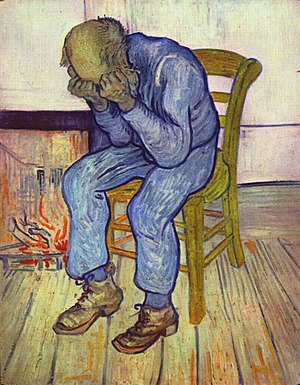 Image via Wikipedia
Image via Wikipedia
Mental Health:
Anxiety: Thousands of New Zealanders suffer from anxiety. The good news is that by knowing the signs you can help lessen the symptoms…
Irritability, excessive worry about every day events, restlessness, nausea and tiredness are all tell-tale signs you're suffering from a bout of anxiety. For most people, the feeling is fleeting, but for others the feelings of exaggerated worry become more of a mainstay, affecting their work, home life, social confidence and ultimately their health and wellbeing.
The good news is there are steps that can be taken to lessen the affects of this often-persistent and powerful disorder. And although sufferers may not feel like it, getting back into life is a big first step. Increased energy levels also play a key part in both creating and managing the symptoms.
Psychological and physiological
There is both a psychological and a physiological component to anxiety. The first thing that happens is the body perceives a threat or a fear as a thought, for example: "What if I make a fool of myself?' or "What if I fail?"
The next step is for the body to then respond by providing extra "energy" that helps to fend off this supposed threat or fear. As the body goes about creating this extra energy there are a number of physiological changes that take place. These include an increase in adrenaline (which is pumped into the body to make us more alert); blood being redirected away from the extremities and to the larger muscles of the body; and the heart starting to work harder in order to move the blood to the larger muscles as quickly as possible.
Of course, these physiological changes also have side effects — faster heartbeat, sweating and muscle tension to name just a few — and it is these side effects that are recognised as symptoms of anxiety.
Symptoms
Excessive and ongoing worry and tension
An unrealistic view of problems
Restlessness
Irritability
Muscle tension
Headaches
Sweating
Difficulty concentrating
Nausea
Frequent need to go to the toilet
Fatigue
Trouble sleeping
Trembling
Feeling on edge
Managing the symptoms
Making a few healthy lifestyle choices can go a long way in helping to control the symptoms associated with anxiety.
At the top of the to-do list is exercise and eating a healthy, well-balanced diet. Reducing caffeine consumption is also beneficial, as is seeking help or support from a friend, family member or professional.
Over-the-counter herbal remedies should be taken with caution as some may contain chemicals that actually increase the symptoms rather than help to control them. Always ask your doctor before taking any medication.
Treatment
Medication: anxiety and depression are very closely associated so doctors often prescribe antidepressants to anxiety sufferers. A class of drugs known as benzodiazepines are also often prescribed, and they work by decreasing the physical symptoms such as muscle tension and restlessness.
Cognitive-behavioural therapy: Helping sufferers recognise and work towards changing reoccurring thought patterns is also beneficial, as is learning to recognise the type of behaviours that often lead to feelings of anxiety. By doing this, sufferers are able to limit distorted thinking and look at situations more realistically.
Relaxation techniques: deep breathing and other relaxation techniques may also be helpful in controlling the muscle tension that often accompanies feelings of anxiety.
A link with depression
Many people who experience social anxiety (when anxiety affects the sufferer's social confidence) also find themselves suffering from depression. However, this illness often goes undiagnosed and, as it leaves the anxiety sufferer lacking motivation, can sometimes interfere with treatment. In these cases, the depression needs to be treated before the issue of anxiety can be addressed.
![Reblog this post [with Zemanta]](http://img.zemanta.com/reblog_e.png?x-id=70d6a4c3-5f01-4530-8a11-38f01fef6660)
No comments:
Post a Comment